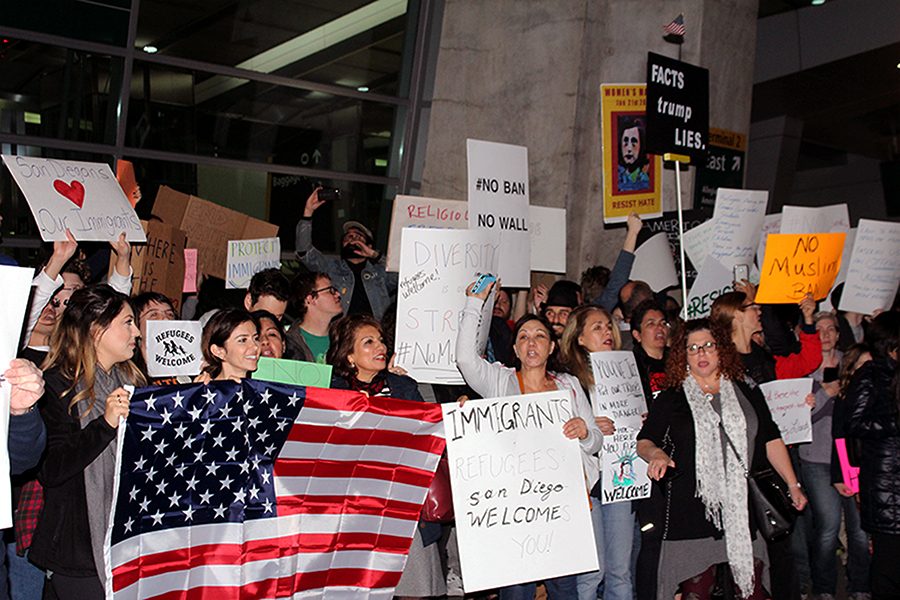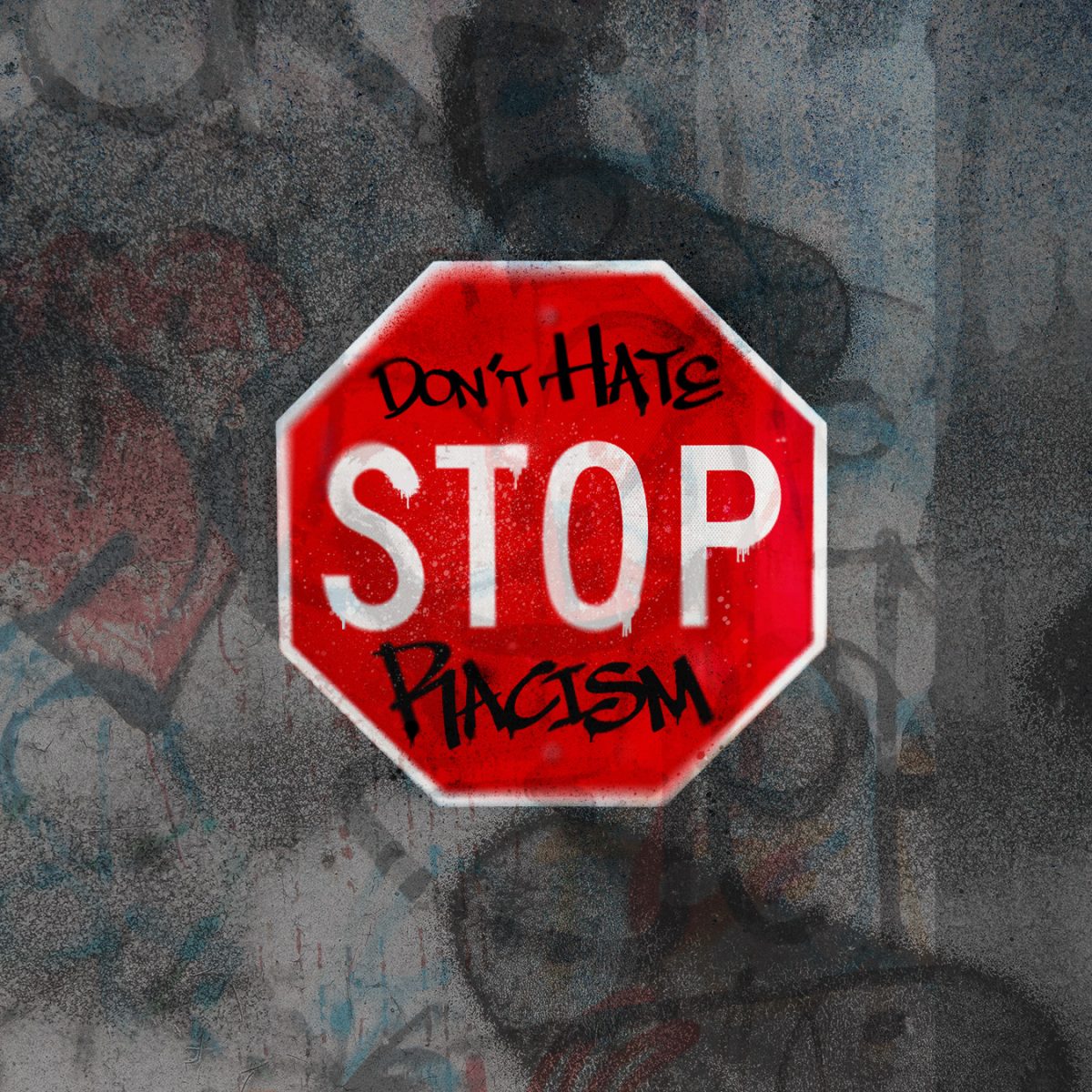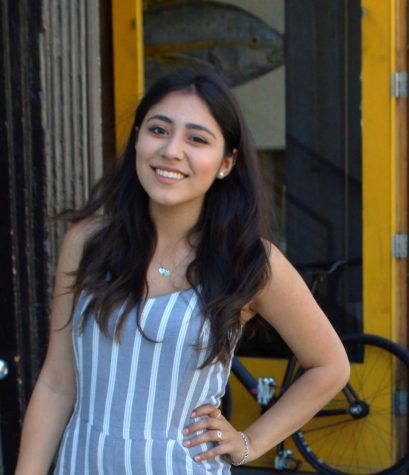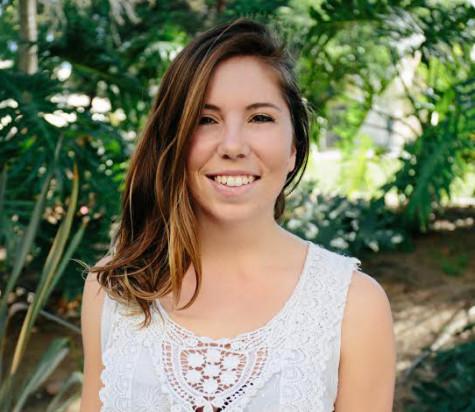San Diego community members gathered at the San Diego International Airport on Jan. 28 and 29 to protest President Donald Trump’s executive order banning citizens of seven Muslim-majority countries from entering the U.S.
Demonstrations occurred all over the country as citizens of Syria, Libya, Iran, Sudan, Iraq, Yemen and Somalia were detained at U.S. airports despite having visas and green cards.
The order bans them from entering the U.S. for 90 days and suspends the U.S. refugee program for 120 days. Syrian refugees are indefinitely restricted from entering.
Chants such as “say it loud, say it clear, refugees are welcome here” were shouted along with signs that read “we the people will protect” and “no ban, no wall.”
San Diego State graduate student Bo Elder attended the protest and said chants were specifically focused against the ban along with Trump’s agenda.
“I think it’s really important people are standing up for their friends, their families, their neighbors and even people they have never met before because they think it’s wrong that people are being targeted by the Trump administration in this way,” Elder said.
UCSD graduate student Sarah Bellout said she decided to attend the protest to stand in solidarity with refugees who need refuge. She said is scared for her friend who is an Iranian immigrant on a student visa.
“I never thought (Trump) would actually do this,” Bellout said. “I can’t believe it’s happening. It’s scary.”
English graduate student Brooke Petersen said she attended the protest because she thinks what is happening in the country is “despicable,” and America needs to be a place where people are welcome.
‘I’m just really proud to be part of something that I know is going to be important,” she said. “I know that this situation is probably going to get worse and I want to be part of fixing it before it can get there.”
She said seeing a crowd of people at the airport on Friday made her feel hopeful, and that it gave people a sense of power to come together and be untied.
“It makes me feel really hopeful,” she said. “ It makes me feel like there really is some chance for us to make a difference. It makes me feel like there is a chance for people who need help to be welcomed.”
President of SDSU Muslim Student Association Ahmed Buzeriba said he wasn’t surprised when he heard of the ban because Trump said he would do it during his campaign.
“My first thoughts were what’s going to happen to my future family members who try to come to the U.S.?” he said. “What’s going to happen to friends I have on current visas?”
Buzeriba attended the protest at the airport and said the protests are an act of unity.
“It’s very powerful because we’re showing we’re willing to exercise our first amendment right to show bigotry, xenophobia and all forms of hate will not be tolerated in this country,” he said. “When we unite, we have the power to shut down illegal executive orders, even if it’s by the president of the U.S.”
California State University Chancellor Timothy P. White sent out a statement on behalf of the presidents in the university system opposing “the divisiveness of the recent executive order.”
The CSU is committed to being an inclusive and welcoming institution of higher education, according to the email.
“When something threatens our ability to think beyond our borders and learn from the world as a whole, we will oppose it,” it reads.
SDSU President Elliot Hirshman sent out an email on Jan. 30 around 4:30 p.m. acknowledging the ban’s effects on the SDSU community.
“We join universities nationwide and the California State University system to express our deep concern as this action is contrary to our institutional values of diversity and inclusion,” the email read.
Buzeriba said the statement was released late compared to other universities, but it was a good message to see.
“I think what our SDSU community needs to understand is that we are a very diverse community, and a part of that diverse community is the international students who were born in the countries listed under Trump’s executive ban,” Buzeriba said. “I’d like to think we care about all of our fellow SDSU students regardless of race or religion.”
He said it would be a great gesture to targeted students if the SDSU community utilized social media accounts to show they stand up against Xenophobic laws that target innocent people.
Director of Media Relations Gina Jacobs said the university sent out the email to reach out to students who are not registered with student visas, such as dual-citizens and permanent residents.
“Right now we’re communicating with those students, identifying them, and making sure that a support system is here on campus,” she said.
“It’s generally about the students who are here studying abroad from those countries and faculty members who are on the list who are here and if they wanted to travel home for any reason, that could be problematic.”
She said the International Student Center supports students who are in the United States on student visas so they are going to be able to assist in any issues they have.
“We’re going to have to continue to watch what’s going to happen,” Jacobs said. “I couldn’t tell you specifically what we’re going to do with each individual case. Every individual case is going to be different.”
“The number doesn’t necessarily encompass every single student that would be actually impacted,” Jacobs said. “That’s one of the reasons we sent out the memo yesterday.”
There are no current study abroad programs to any of the seven countries affected by the executive order listed on the Aztec Abroad website.
















